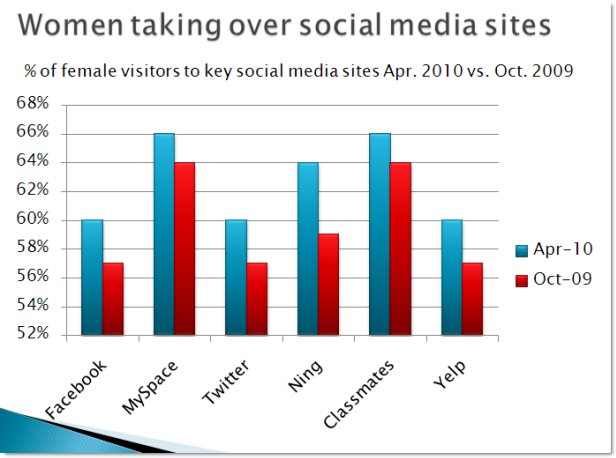In October 2009, in a post called In the World of Social Media, Women Rule, Brian Solis
reported that there are more women than men on most social media sites.
It’s been 6 months since then – what does the male/female ratio look like now?
To find out the answer, I recreated Brian’s data, using Google’s Ad Manager as he did, to compare apples to apples, and found that…
Women now dominate social media even more than they did 6 months ago!
And the shift is significant!
Here’s the raw data:
[TABLE=2]
I find it interesting that:
- In almost every case, the percentage of women visiting each site increased over the last 6 months.
This raises the question: are women being drawn to these sites even more heavily than they were before, OR are men not finding what they want on these sites and frequenting them less often?
Note: this data comes from people actually visiting the sites, as measured by Google. So, the numbers probably can’t be explained as sploggers using women’s names and risque pictures in their profiles. This data should be fairly clean. - The sites where the percentage of visitors either increased or remained flat were ustream, YouTube, Flickr and Bebo. Could it be that men are more attracted to watching video and viewing pictures online than women, so these sites are better filling their needs?
And no, I’m clueless about the Bebo shift. - I included the unique visitors (as measured by Google as estimated cookies) to show the differences in impact across the sites.
What can marketers learn from this data?
- The impact of women is rapidly growing in social media. Why, we can only guess (and I’d love to hear your guesses in the comments below.) If you market to women or have a product where women are the decision makers/gatekeepers, you need to have an active, participatory presence in social media.
- How you interact on social media is also vital. Women are more active on a daily basis; actively publish, post to and read blogs, and are more likely to make purchase decisions based on blogs and social media recommendations (source: blogher study.) They also tend to be more interactive, and less likely to respond to “brochure-ware” sites and non-interactive social media placeholders.
- If you market to men, you may want to consider revising your approach to better meet the needs of your audience. Video should definitely play a role.
What else can we learn from this data? How do you explain this shift? What will you do differently as a result? Let us know by posting a comment below.




